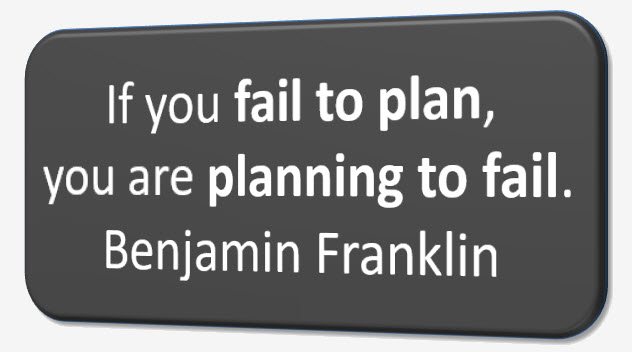 When someone tells me that they want to become a Certified Quality Engineer, one of the first questions I normal ask them is if they have a plan to get certified.
When someone tells me that they want to become a Certified Quality Engineer, one of the first questions I normal ask them is if they have a plan to get certified.
The answer is generally a short pause, with maybe an “uh” thrown in there, followed by a no.
So I wanted to help you out by sharing my own study plan that you can use too!
When I created this study plan I focused on creating a plan that was optimized for efficiency & effectiveness.
Those two words are super important:
- Efficiency – doing something quickly, and
- Effectiveness – doing something RIGHT
I wanted to create a study plan that would be the best use of my time (Efficient) and that get me certified (Effective).
After publishing this page – I’ve since created a page full of free practice exams.
Use these practice exams to identify gaps in your knowledge, and put together your own unique study plan based on your own personal strengths and weaknesses.
I did want to take some time and explain how the study plan was created including the key learning concepts used in creating the plan which include:
- Starting with a “SMART Goal“
- Breaking down our SMART goal into Micro Goals using the CQE Body of Knowledge
- Using & understanding Spaced Repetition to turn studying into a Daily Habit
Then we can talk about how you can tailor this generic plan for your own needs, skills & current knowledge.
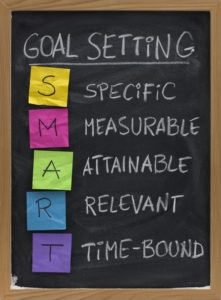 The SMART Goal
The SMART Goal
Just about everyone who comes to this website shares a common goal: to become a Certified Quality Engineer.
That’s almost a SMART goal, which is defined as:
- Specific – Your goal should targets a specific area for improvement
- Measurable – Your goal should include a measurable indicator of success
- Attainable – Your goal should be realistically achieved
- Relevant – Your goal should result in a measurable difference for you
- Time-Bound – The goal includes a definition of when you expect the result will be achieved
The goal of becoming is Certified Quality Engineer is Specific & Measurable because you know what success looks like, and you know when you achieve it.
Becoming a CQE is also Attainable – regardless of what your gut may tell you, you can do it.
As for Relevancy – If you’re reading this, there’s a very high probability that becoming a CQE is very relevant to you.
The goal of “becoming a CQE” is not Time-Bound. So let’s address that now.
 How long Should It Take To Get Certified??
How long Should It Take To Get Certified??
We can easily make our goal time bound by changing it to: become a CQE in 26 weeks.
You might wonder. . . . . How did I land on 26 weeks?
Well, for starters, this is exactly one half of a year which makes the math easy to further break down all of the topics into micro (Weekly & Daily) goals as part of the study plan.
More importantly though, this time frame was picked because if you were to study for 1 hour a day for every weekday that would be 130 hours (1*5*26).
130 hours is approximately how much time I estimate it would take to adequately cover every topic on the exam!
That’s if I assume that you’re starting from scratch.
And what are those topics exactly that you would have to learn??
Let’s cover that next and then I’ll show you how I broke all of those topics down into micro-goals.
The 2022 CQE Body of Knowledge
The study plan is based on the 2022 CQE Body of Knowledge (BOK).
If you’re not already familiar, ASQ published a Body of Knowledge for each certification that defines exactly what you need to know to become a CQE.
Not only that, they also publish the number of exam questions associated with each Pillar.
As we dive deeper into the study plan and discuss how much time is allocated to each topic you’ll notice that the plan is structured to align with the number of exam questions associated with each topic.
So for the topics that have more exam questions they have more study time associated with them.
Not only that, but I’ve also gone so far as to break down each pillar into its individual topic to help you know where to focus within each topic.
Here’s that same table in a pie chart – as you can see the Statistics (Quantitative Methods & Tools) portion of exam is almost 25% of the exam!
And the study plan reflects this!
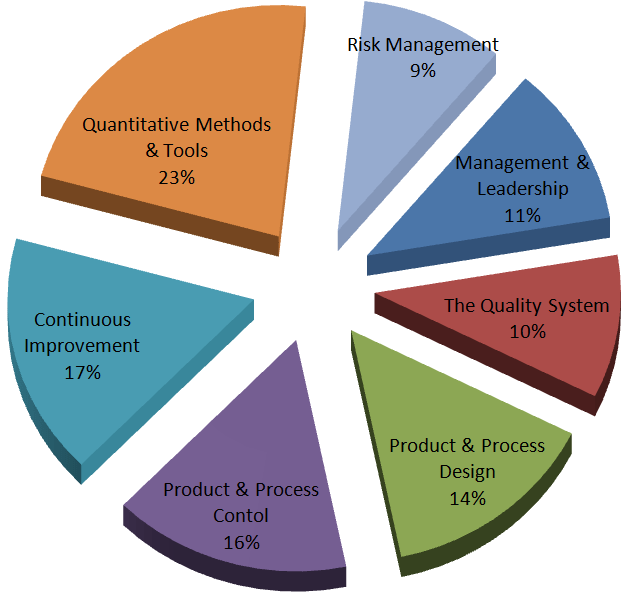
The Cognition Level of Each Topic
The next piece of information that I’ve used to structure the study plan is the cognition level associated with each exam topic .
These cognition levels come from Bloom’s Taxonomy and is a hierarchical model used to classify educational learning objectives into levels of “cognition”.
Essentially, the cognition level defines the level of understanding that you should have for each topic.
So for topics that only require you to “remember” or “understand” those concepts, the plan allocates less study time as compared to topics that require you to be able to “apply”, “analyze” or “evaluate” those topics.
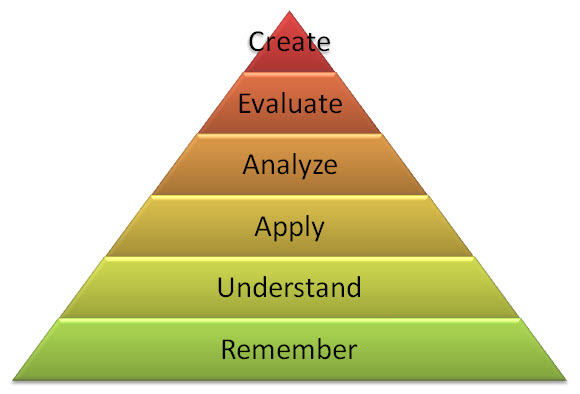
ASQ is also generous in defining these cognition levels within the Body of Knowledge (Below).
I used those cognition levels when putting together the study plan.
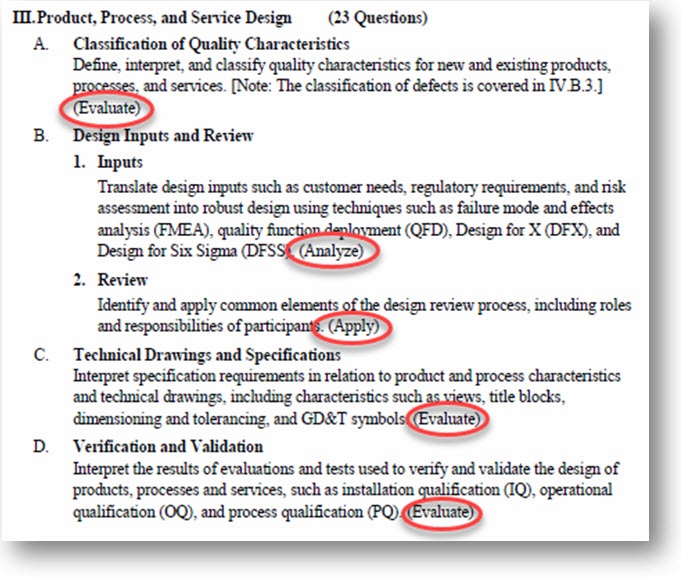
So let’s get to the actual study plan already!
The Study Plan!
Ok – here’s a quick high level, week by week overview of the plan.
As you can the plan doesn’t simply follow the CQE Body of Knowledge from top to bottom:
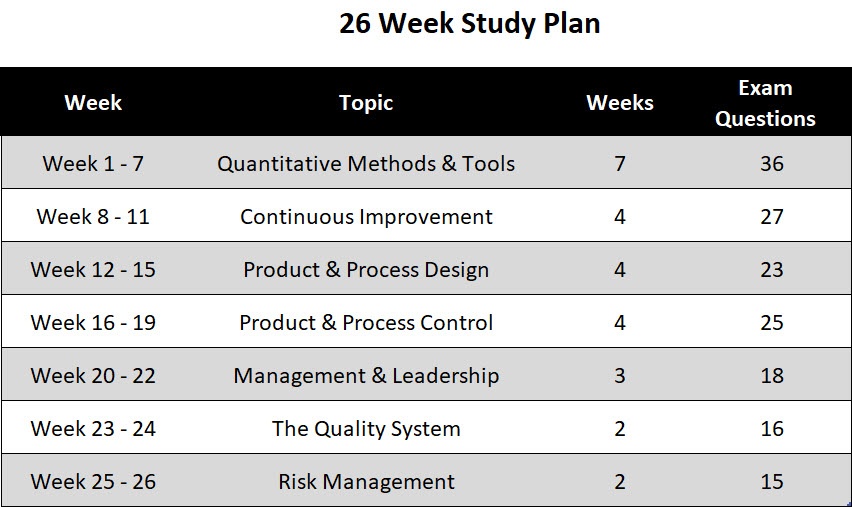
Spaced Repetition and the Forgetting Curve
One important concept in Education, Memory & Learning that I used to create the study plan is the idea of the Forgetting Curve & Spaced Repetition.
These concepts are covered in detail in the Quality Training chapter, but I’ll summarize it here.
Shown below is what’s called the Ebbinghaus Forgetting Curve and is shows how quickly you will forget something after learning it.
Brain Researchers have long been studying this phenomenon to improve the science behind learning.
In that research they have developed a learning techniques that improves your long term memory retention and reduce the total amount of time needed to learn a new subject.
They call it Spaced Repetition.
Spaced Repetition is the practice of strategically spacing out your study sessions over time and ensures that material is committed to long memory.
Watch this graph carefully (follow the dark orange line)!
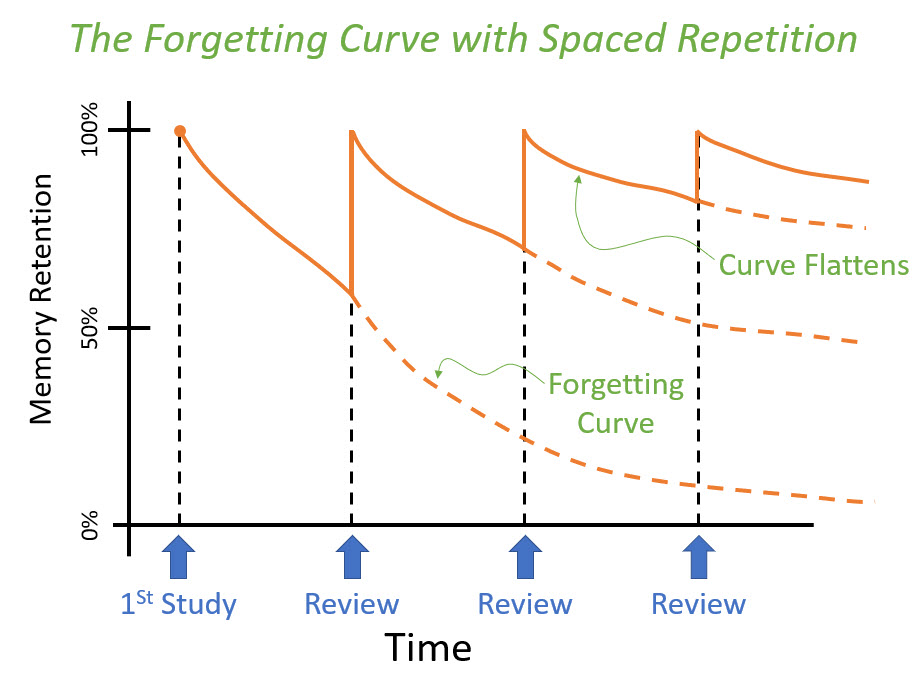
Research has shown that each time you review your material, your retention jumps up to 100% and the rate of forgetting slows down (slope of the line).
This is where the information is being committed to long term memory!
I say all that so that you understand why I’ve included so much review time into the study plan.
Statistics Is First?? WHY!
People often ask my why I made Statistics (Quantitative Methods & Tools) the first topic of the study plan.
My mind always jumps to a quote from Mark Twain.
“If it’s your job to eat a frog, it’s best to do it first thing in the morning. And If it’s your job to eat two frogs, it’s best to eat the biggest one first.” – Mark Twain.
Statistics is the biggest frog.
Statistics is the topic that scares people the most and by putting it first you’ll find out very early whether or not the certification process is for you or not.
If you can learn Statistics, then you can learn anything within the BOK. You’ll also be the most motivated during this time period, and I want to take advantage of that.
Lastly, the statistics topics are “foundational” to many of the other topics throughout the BOK and it make sense to go over them first from that perspective.
Daily Study Goals & Study Habits
Now that we’re comfortable with the overall study plan structure, let’s go deeper.
Each high level topic is then broken down into a daily study goal.
For example, below if the Statistics portion of the exam, broken down into a daily topic for each of the 7 weeks.
In that time period you should be reading, studying and quizzing on that particular topic.
You’ll find this same breakdown for each topic on the exam.

This is where you will have to establish a daily study habit.
You’ll have to be intentional about this.
Successful people don’t “find time” for the important things in their lives – they MAKE TIME.
Set time aside every day to study, and then use the study plan to hold yourself accountable.
This is one of the most important points in this whole conversation.
I’ll repeat myself here – you need to be intentional about making time to study.
 Customizing The Study Plan
Customizing The Study Plan
The whole study plan was created under the assumption that you’ve got equal experience in every area.
However, it’s likely that you’ve got specific experience in one or more of the areas within the BOK.
For me it was Continuous Improvement but for you it could be the Quality System or Product & Process Control, whatever.
This is why I give the spreadsheet away, so that you can it modified based on your experience.
You can also compress this timeline if you absolutely have to.
One other way to compress this timeline is to remove the review weeks and that review time into the existing study time for each topic – although I don’t really recommend this. . .
The other thing you can do to compress the timeline is to study on the weekends, which are excluded from the plan currently.
Conclusion
Alright, let’s wrap this up.
Basically, you’ve got yourself a 26-week study plan that I’ve optimized for efficiency & effectiveness.
This study plan starts by creating a SMART Goal which is to become a Certified Quality Engineer in 26 Weeks.
We then break that SMART goal down into micro (weekly & daily) study goals.
These weekly & daily goals are completely aligned with the CQE Body of Knowledge.
The study time allocated to each topic is aligned with its respective number of exam questions and the published cognition level for that topic.
And now all you have to study is to start studying!
